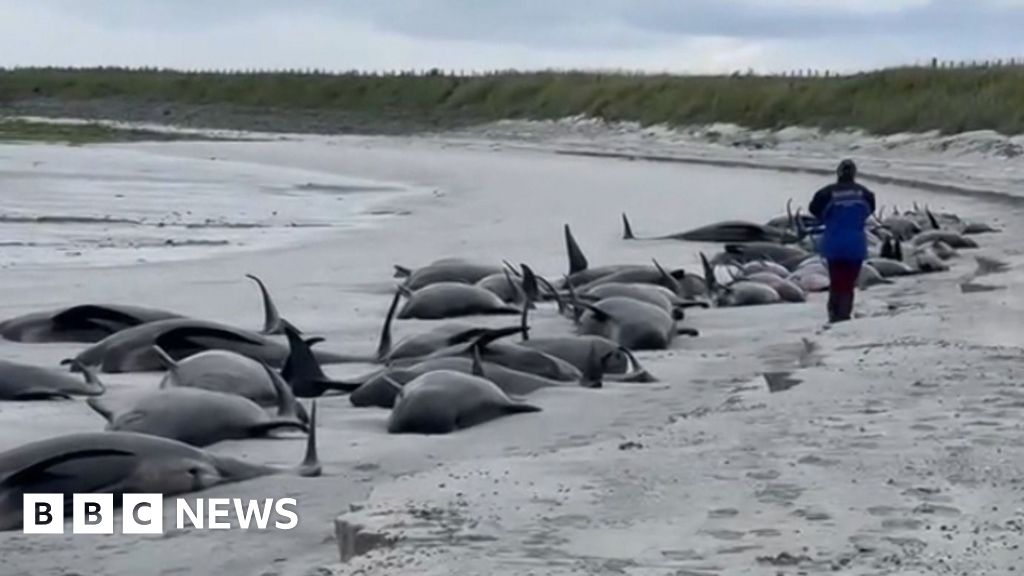A pod of 77 pilot whales has died after washing ashore on a beach in Orkney in what could be the biggest mass stranding for decades.
The British Divers Marine Life Rescue (BDMLR) had established 12 of the animals at Tresness Beach on the island of Sanday were still alive when they came out of the water.
However the decision was taken to euthanise them after refloating efforts failed.
The pod included male whales up to seven metres (22ft) long as well as females, calves and juveniles.
Experts say it is too early to know what has caused the stranding, but it is likely one of the whales got into trouble and the rest of the pod tried to help.
but it is likely one of the whales got into trouble and the rest of the pod tried to help.
They’re more human than we are at this point, in other words.
“HELP HELP!”
Look away, they don’t mean us.
I bet you navy exercises had something to do with it.
I don’t now how often pods come close to shore or how many pods there are but I wonder if it’s feasible to attach trackers to some of their members and have the coast guard kind of lead them away whenever a pod looks like it’s about to beach themselves.
This is the best summary I could come up with:
A pod of 77 pilot whales has died after washing ashore on a beach in Orkney in what could be the biggest mass stranding for decades.The British Divers Marine Life Rescue (BDMLR) had established 12 of the animals at Tresness Beach on the island of Sanday were still alive when they came out of the water.However the decision was taken to euthanise them after refloating efforts failed.The pod included male whales up to seven metres (22ft) long as well as females, calves and juveniles.Experts say it is too early to know what has caused the stranding, but it is likely one of the whales got into trouble and the rest of the pod tried to help.Members of the public are being asked to stay away from the area while post mortem examinations are carried out.
One was successfully re-floated while the rest had to be euthanised.Between 60-70 of the animals came into shallow waters in Sutherland in 2011.According to the Natural History Museum, the largest UK stranding took place in 1927 when 126 out of more than 130 false killer whales died in the Dornoch Firth in the Highlands.
The whales needed to be moved back into an upright position as quickly as possible if there is to be any chance of saving them.But the soft sand meant the whales fell back over when the rescuers attempted to right them.Emma Neave-Webb from the BDMLR said early on that while these experiences are difficult, the thinking had to be “realistic”.
BDMLR medics were brought in from mainland Orkney and Inverness to help with the rescue attempt, but Ms Neave-Webb said it appeared the whales had been stranded for “quite some time”.She described the scene as “really quite horrible” and “hugely emotional”.Rescuers attempted to keep the whales alive by pouring sea water over them, but the decision was later taken to euthanise them.
A spokesperson for Orkney Islands Council said discussions were taking place with community representatives on how best to dispose of the bodies.They said: "In previous circumstances where whales have beached on our shores and subsequently died, the approach from our Environmental Health team around disposing of the body has been to allow nature to take its course - with the public advised to stay away from the area.
“Our assessment in this case, given the scale and the likely public health implications, is that more definite action will need to be taken, for example burying them where they are or removing the bodies to a large grave site elsewhere.”
The original article contains 647 words, the summary contains 420 words. Saved 35%. I’m a bot and I’m open source!




